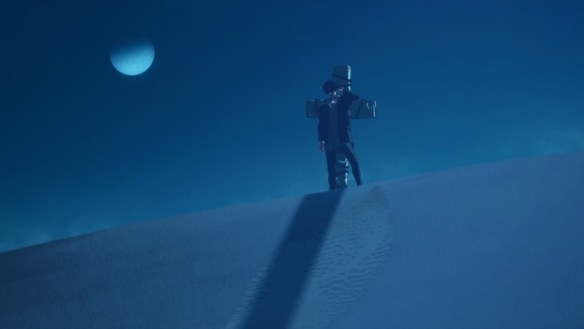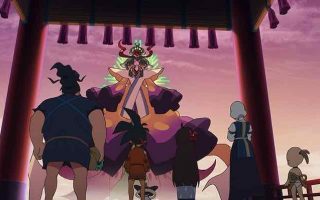Hello folks, and welcome back to Wrong Every Time. Today I thought we’d journey back to No Man’s Land, and see how things are faring in Trigun Stampede. Our last episode offered a ruthless demonstration of life’s brutality here in this desolate place, as we were introduced to a young boy named Rollo suffering from a debilitating illness, and that same boy as a man who had been monstrously transformed by Knives and his associates. Vash’s promise to this boy was proven hollow; while he could do nothing but offer tears and apologies, it fell to Wolfwood to provide Rollo’s last rites.
The episode offered a tidy summation of Vash’s ambiguous role here in No Man’s Land. His motives are pure; he simply wants to help people where he can, and refuses to raise a hand in anger. He is understandably afraid of his own god-like power, and wishes at all costs to avoid becoming a self-assigned arbiter like Knives, the one who unilaterally chooses who lives and who dies.
However, in a world as harsh as No Man’s Land, simple kindness is often not enough to ensure a positive outcome. Saving Rollo would have required dismantling the society that chose to sacrifice him – similarly, saving many others could have been achieved simply by executing one or another murder-happy bandit, an act of arbitration that most would agree is worth the cost. Equipped with infinite power yet unwilling to use it for even the most obviously righteous reasons, it’s understandable that someone like Wolfwood would call Vash a hypocrite; even if pacifism is a noble pursuit, it is a philosophy unequipped to handle the cutthroat moral calculus of life on the barren frontier.
What good is a superman who never interferes, who offers moral support or stands in judgment, but will not lift a hand to change the world? I imagine these questions are weighing on Vash as well as we return to Trigun Stampede!
Episode 6
We open in near-darkness, with a man in a blue suit fleeing across the moonlit dunes. Like the austere, geometric geography of Land of the Lustrous, Trigun’s sparse background scenery successfully compliments Studio Orange’s CG characters. CG art is naturally composed of smooth lines and shapes, so leaning into rough texture and background detail often makes it feel out of place (an issue that Dorohedoro’s adaptation couldn’t really help but contend with). We can’t yet make CG look convincingly organic, but we can make our worlds look inorganic to match it, as in productions like The Amazing Digital Circus
We see he is being pursued by Wolfwood. Our executioner takes a hail of bullets, then staggers and consumes a tube of some blue liquid
Nice work with the shadows here as Wolfwood does his work, letting his cross loom far across the dunes
The OP does a fine job of articulating Vash’s frustration. He is stuck in a day that feels perpetual precisely because time works so differently for him – he sees everything around him collapse and rot, but he stays exactly the same. What is the point of intervention if it will only spark regret, or prompt a risk of him becoming like Knives? If everything is going to fade in the blink of an eye anyway, if he is doomed to be stuck in a perpetual present because he himself does not age, then isn’t it better to simply be an observer? What right does he have to manipulate this world he naturally stands apart from? And why interfere, if the only lasting outcome will be his own regrets?
We hop back in with the crew in their buggy again, Vash and Wolf silently feuding while Meryl takes a sippy
Roberto says they’ll take a Sand Steamer to get to JuLai. I love this world’s odd mixture of quasi-frontier era innovations and technology scrapped from the arcs; there are many spins on “living in the bones of a technologically superior civilization,” and taking it in a wild west direction is an excellent one. In fact, just pinning it down like that has me realizing I’m actually doing something similar for my upcoming tabletop game
The Sand Steamer is absolutely enormous, a craft big enough to brush off the threat of sandworms
Meryl questions why Roberto is letting Vash go free, and he explains that Vash is simply beyond their abilities to contain
“We’re writing for a tabloid. Nothing worth risking our lives over.” Shifting Meryl’s profession from insurance arbitrator to tabloid writer does make more sense. The idea that No Man’s Land could support a thriving insurance industry is a funny gag, but not a believable bit of worldbuilding
Meryl responds with a stare so harsh that if she were a Ghibli heroine, her hair would undoubtedly be billowing up in anger
A brief shot of a world map reveals that No Man’s Land is largely structured like earth, with the Great Sand Sea replacing our array of oceans
Wolfwood claims he is acting as Vash’s “babysitter,” as the one willing to kill the evildoers Vash will not
Lots of nice symmetrical layouts in this episode, as well as a great sense of scale for this Sand Steamer crossing the sea. The collective emotional effect of these wide open compositions is a sense of relief and freedom, like we’re finally stretching our arms after the claustrophobic last two episodes
“The only reason you’ve survived this long is because other people have died instead.” Wolfwood again states that Vash’s philosophy is not kindness, but cowardice. He’s not preventing violence, he’s just ensuring that his share of violence falls on others
A tall, lanky man approaches and opens on them with twin submachine guns. Some nice physical choreography as he and Vash exchange blows
Also impressed with how they convey the weight of Wolfwood’s cross. He’s constantly buckling under it, adjusting his pose so he can carry it with his legs more than his arms
“Once Upon a Time in Hopeland.” Incidentally, if you haven’t seen the original Once Upon a Time in the West, make an appointment. An absolutely essential film
Apparently their attacker’s name is Livio
We cut back in on what appears to be Wolfwood’s childhood, rendered in lovingly hatched traditional animation, and conveyed as a silent film complete with dialogue cards
We see Livio’s arrival at Wolfwood’s orphanage, presumably a feeder organization for Knives’ associates
In spite of Wolfwood’s reservations, he works to cheer Livio up and offer some community in this strange new place
“You’re finally smiling, crybaby Livio.” We receive both context for and a counterpoint to last episode’s drama; like Vash, Wolfwood has at times dedicated himself to protecting what is gentle and kind within this world, a quest that always ends the same unfortunate way
This episode was boarded and directed by Minoru Yamaoka, who appears to be one of the team’s stronger assets – they’ve handled a couple of series as full director, been unit director on films, and directed episodes of both Terror in Resonance and Kids on the Slope. A good choice for this sparse story of childhood friendship
I suppose this is one way to make Wolfwood reckon with Vash’s perspective: ask him to make the exact same choice Vash was presented with
Meanwhile, Meryl is barreling across the sand in her jeep, and appears to have attracted a crowd of neon-decked bandits
A group of cyborgs tell young Wolfwood he has “passed the selection test,” and that he is a “child of blessing.” So it seems Knives was culling children from a variety of locations, all under the auspices of his self-oriented religion
And now this kaleidoscopic representation of Wolfwood’s drug treatment process! These sequences actually bring to mind the distinct “rough illustration” style of The Woman Called Fujiko Mine; I wonder if Yamaoka’s time working under Shinichiro Watanabe brought him in contact with Sayo Yamamoto at all
Also a touch of Madoka’s quasi-cut paper fantasies, particularly Kyoko’s backstory
“He’s grown so much in so few months.” Like Rollo, Wolfwood’s aging was heavily accelerated by the treatment process
“I’m going back to the orphanage!” And also like Rollo, he dreamed of a glorious return, that all the changes wrought upon him might be forgotten if he could only make it home
He is then invited to join the “Eyes of Michael,” undoubtedly referring to the Archangel Michael, as well as the line-and-eye insignia that all of Knives’ forces wear
“We worship a beautiful angel.” “I don’t believe in any god.” On that at least, Wolfwood and Vash likely agree. No gods but those of our own making, and we have a tendency to make truly awful gods
He is forced into service through the threat of Livio suffering a similar fate
Appropriately, the head of this drug testing program is a priest, Father William
“You know him, right? You have to help him!” “It’s too late.” Wolfwood is trying not be a hypocrite, but this is still a bitter situation; he knows Livio is past saving, but doesn’t want to actually pull the trigger
This makes for a nice symmetry with the previous episode. Instead of Wolfwood pulling the trigger where Vash could not, this episode sees Vash offering sympathy where Wolfwood cannot, their similar but mirrored philosophies adding up to one cohesive whole
“I can’t let you two kill each other!” And with his own values stretched to this extreme, Wolfwood is forced to concede he values both their lives
“He’s purely trying to protect too much.” Wolfwood’s Eyes of Michael compatriots put it bluntly
Love this mournful, saxophone-led composition as their craft comes under fire from both the Eyes and bandits
And Done
Whew, what a cliffhanger! And what an episode in general! This was absolutely the production’s most visually distinctive so far, combining Orange’s reliably frenetic, free-moving action choreography with beautiful and eminently appropriate aesthetic flourishes for Wolfwood’s childhood and transformation process. It also served as a clean mirror of the previous episode, challenging Wolfwood on many of the same moral fault lines as Vash, and demonstrating his own commitment to cutthroat pragmatism is a fickle rule that elides his personal connections and long-battered humanism. All that plus this thrilling final fusion of basically every dramatic thread so far, with brothers, assassins, bandits, and poor sand steamer guards all hanging in the balance. It would seem Trigun Stampede is only gaining speed!
This article was made possible by reader support. Thank you all for all that you do.




